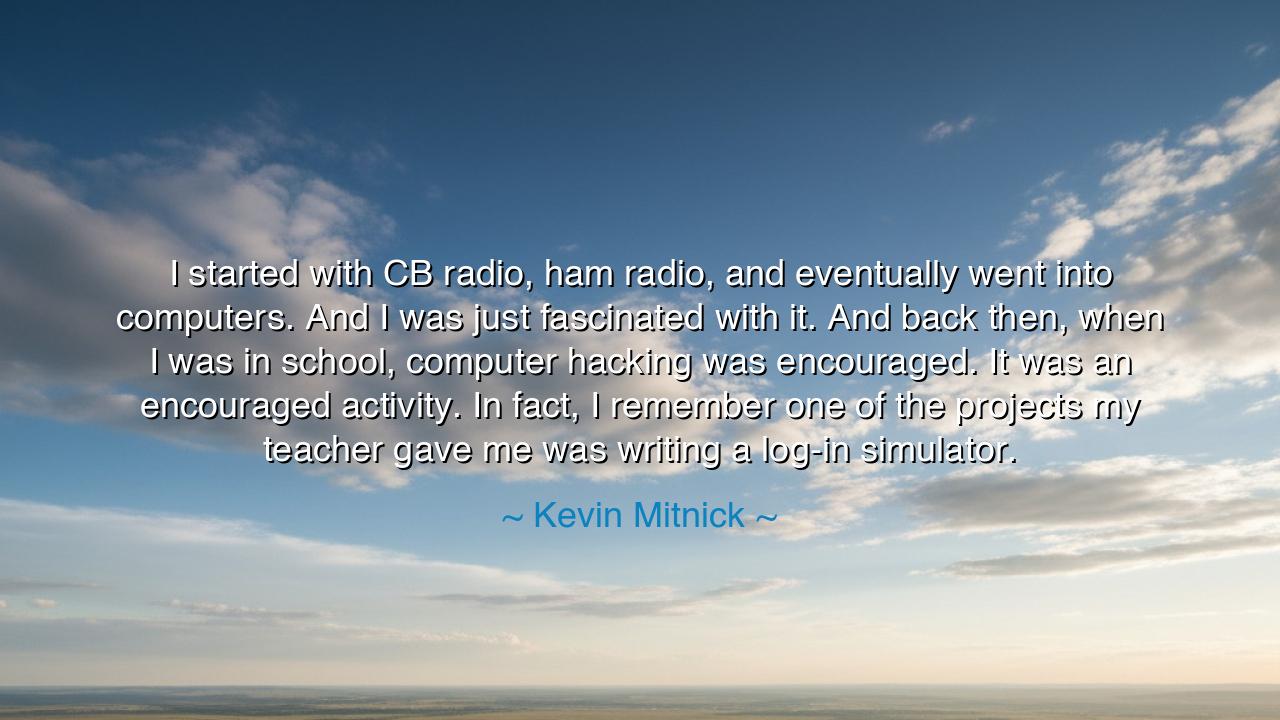
I started with CB radio, ham radio, and eventually went into
I started with CB radio, ham radio, and eventually went into computers. And I was just fascinated with it. And back then, when I was in school, computer hacking was encouraged. It was an encouraged activity. In fact, I remember one of the projects my teacher gave me was writing a log-in simulator.






"I started with CB radio, ham radio, and eventually went into computers. And I was just fascinated with it. And back then, when I was in school, computer hacking was encouraged. It was an encouraged activity. In fact, I remember one of the projects my teacher gave me was writing a log-in simulator." – Kevin Mitnick
In the ancient world, there was a time when the great minds of civilization were captivated by mechanical wonders—the astrolabe, the water clock, the ancient loom. These were the tools that shaped the course of human ingenuity and progress. The creation of these instruments was not born from fear or restriction, but from a deep curiosity and a thirst to understand the world around us. Kevin Mitnick, in his journey through the world of technology, embodies a similar spirit of discovery—a curiosity that first emerged through the humble and accessible mediums of CB radio and ham radio, before evolving into the complex world of computers. What Mitnick reveals in his words is the innocent fascination that leads to true mastery, and how in the beginning, hacking—an act once deemed a noble pursuit—was encouraged as a form of exploration, creativity, and learning.
In the same way that the great thinkers of the ancient world—Archimedes, Pythagoras, and Aristotle—relied on their tools to unlock the mysteries of the universe, Mitnick, as a young learner, found his tools in the radios and later the computers of his age. Just as these ancient philosophers did not see their intellectual pursuits as mere hobbies, but as quests for deeper truth, so too did Mitnick approach computers with the same enthusiasm and curiosity. To him, the act of hacking, which today is often viewed through the lens of illegality or immorality, was once seen as an expression of intellectual challenge, a means of understanding the very fabric of digital systems. Teachers, rather than chastising him, encouraged this exploration, understanding that curiosity itself was the spark of true learning.
In those early days, before the advent of the internet, the world of computers was like the unexplored seas of ancient times, vast and mysterious. For those who dared to dive into its depths, there were treasures to be found: knowledge, freedom, and mastery over a new form of communication. The act of hacking was not simply an act of breaking into systems; it was a way of understanding and redefining the boundaries of what was possible. In a sense, the hackers of Mitnick's generation were the pioneers, much like the explorers who charted the unknown territories of the New World. Hacking, in this light, becomes a quest—a search for knowledge and a drive to push the boundaries of the known world.
Consider the journey of Leonardo da Vinci, whose curiosity about the human body, the natural world, and mechanical devices led him to invent many things centuries ahead of his time. Leonardo’s exploration was not bound by rules, but driven by a thirst for understanding and discovery. Like Mitnick, he was a disruptor, someone who sought to break the traditional molds and look at the world from a fresh perspective. Both da Vinci and Mitnick share the same relentless curiosity, the same drive to understand, to make sense of complex systems, whether in art, mechanics, or computers. In Leonardo’s sketches, we see the birth of inventions that would shape the future, much like the early hacking experiments of Mitnick, which foreshadowed the profound role that computers would eventually play in reshaping society.
However, as the world evolved, so too did the perception of hacking. Once seen as an act of intellectual curiosity, hacking became synonymous with illegality and immorality. The shift in attitude reflects the growing tension between creative freedom and control. The very exploration that was once encouraged now faces the cold light of regulation and enforcement. The contrast between Mitnick's early experiences, where hacking was seen as an opportunity for growth, and the world today, where hacking often brings with it legal consequences, underscores the tension between innovation and order in human societies. The rise of digital security and the increasing presence of laws to protect systems reflect the fears of a world that seeks to control what was once free and open.
The lesson here is clear: true innovation is born from curiosity, and in its purest form, learning is not confined by boundaries. It is the unquenchable thirst for knowledge that drives us to explore the unknown. Yet, with this curiosity comes the responsibility to respect the systems we interact with, for the boundaries we break may sometimes cause unintended harm. Mitnick's journey, from innocent exploration to notoriety, serves as a reminder of both the beauty and danger that accompanies creative curiosity in an increasingly complex world.
We must strive to nurture curiosity in future generations, just as Mitnick’s teachers did, encouraging them to explore, to break down the systems they inherit, and to learn in ways that are creative and unconstrained. But we must also teach the importance of responsibility, guiding them to use their skills not to break what has been built, but to improve, to innovate, and to create systems that elevate the human experience. In this delicate balance between freedom and responsibility, between curiosity and respect, we find the true essence of progress.






AAdministratorAdministrator
Welcome, honored guests. Please leave a comment, we will respond soon